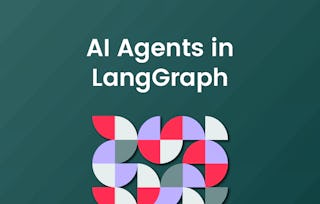Ready to build intelligent AI agents that can reason, improve, and collaborate? This hands-on course gives you the skills to build agentic AI systems using LangChain and LangGraph in just 3 weeks.

您将学到什么
Build agentic AI systems using LangChain and LangGraph to support memory, iteration, and conditional logic
Design and implement self-improving agents using Reflection, Reflexion, and ReAct architectures
Apply agent orchestration techniques to build collaborative multi-agent systems
Implement agentic RAG systems that route queries and support retrieval-enhanced reasoning
您将获得的技能
要了解的详细信息

添加到您的领英档案
11 项作业
了解顶级公司的员工如何掌握热门技能

积累特定领域的专业知识
- 向行业专家学习新概念
- 获得对主题或工具的基础理解
- 通过实践项目培养工作相关技能
- 获得可共享的职业证书

该课程共有3个模块
This module introduces LangGraph for building intelligent, stateful AI agents that support memory, iteration, and conditional logic. You’ll explore how nodes, edges, and shared state enable dynamic workflows, and how LangGraph extends LangChain for advanced control. Through foundational concepts and hands-on practice, you’ll learn to design, build, and execute workflows that reflect real-world agentic behavior
涵盖的内容
6个视频2篇阅读材料4个作业1个应用程序项目5个插件
This module focuses on building self-improving AI agents using LangGraph. You’ll explore and implement Reflection, Reflexion, and ReAct agent architectures to design workflows that evaluate and refine their own outputs. Through guided labs, you’ll gain hands-on experience creating agents that reason, integrate feedback, and improve performance using structured approaches grounded in reflection and prompt engineering.
涵盖的内容
5个视频1篇阅读材料4个作业3个应用程序项目2个插件
This module focuses on designing and implementing multi-agent systems using LangGraph. You’ll explore how specialized agents can collaborate to solve complex problems through structured orchestration. Key topics include core principles of multi-agent systems, collaboration patterns, and governance considerations. Through hands-on practice, you’ll build a multi-agent RAG system that dynamically routes queries to relevant data sources, gaining practical experience in coordinating specialized agents to enhance retrieval and reasoning.
涵盖的内容
4个视频3篇阅读材料3个作业1个应用程序项目3个插件
获得职业证书
将此证书添加到您的 LinkedIn 个人资料、简历或履历中。在社交媒体和绩效考核中分享。
提供方
从 Software Development 浏览更多内容
 状态:免费试用
状态:免费试用 状态:免费试用
状态:免费试用 状态:免费
状态:免费DeepLearning.AI
人们为什么选择 Coursera 来帮助自己实现职业发展

Felipe M.

Jennifer J.

Larry W.

Chaitanya A.
学生评论
- 5 stars
82.66%
- 4 stars
12%
- 3 stars
1.33%
- 2 stars
2.66%
- 1 star
1.33%
显示 3/74 个
已于 Jan 20, 2026审阅
Great course with intro to agent & Muti agent.
已于 Aug 21, 2025审阅
Great overview and the insight into the coding aspects was invaluable!
已于 Nov 1, 2025审阅
Good, Make it a little more clear on teaching the code and specific functions for agentic systems
常见问题
Skills in agentic AI development are highly valuable for roles such as Software Developer, Data Scientist, Machine Learning Engineer, AI Engineer, and Automation Specialist. These positions involve building intelligent systems that use language models to reason, interact with tools, and automate complex workflows. These capabilities are increasingly in demand across industries where adaptive, language-driven automation is transforming how work gets done.
No prior machine learning (ML) experience is required. If you're comfortable with Python, you're ready to go. This course focuses on building practical agentic AI systems that reflect, improve, and act. No complex ML understanding is required.
Traditional development builds static applications, and prompt engineering fine-tunes LLM responses. But agentic AI development focuses on designing autonomous, stateful systems that can evaluate their outputs, manage memory, and interact intelligently over time. You'll learn how to architect systems that think, adapt, and collaborate, using tools such as LangGraph to build workflows with cycles, conditionals, and inter-agent communication.
更多问题
提供助学金,









